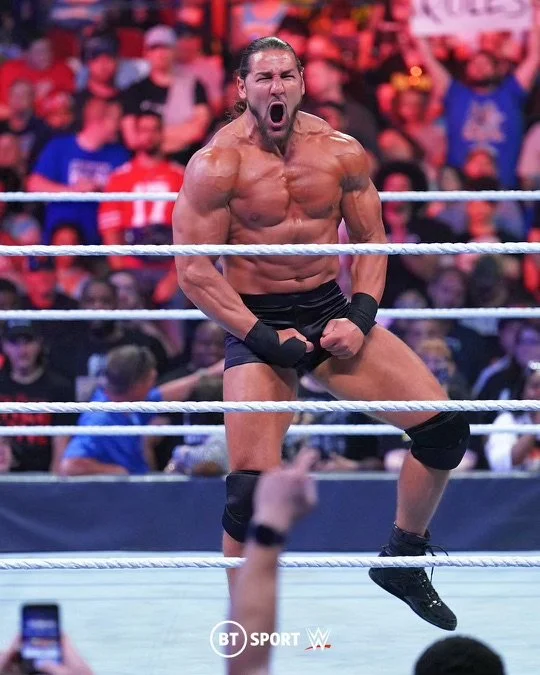Training Like a Pro
Now that I’m not a professional athlete, should I still train like one?
For the last two decades, I’ve had very specific goals with regards to my training. From the early days of high school until just after college, I was training to be an elite football player. For the following ten years, I was a Professional Wrestler with WWE, with matches 52 weeks a year. All in all, for the last 20 years I have had to train to have elite levels of strength, speed, power, endurance and muscularity, and that training has been the most consistent part of my everyday life. In that time, a style of training has been ingrained in me; a style which emphasizes performance. But now that performing is no longer the central focus of my life, it begs the question - should I still train like it is?
For some, the answer may seem obvious; of course you shouldn’t. You don’t need to be able to chase down running backs, take on offensive lineman, absorb the force of a superplex from the top rope or throw grown men over your head, so why train like you need to? Take it down a notch, man.
Admittedly, anyone saying that would have a point. Obviously competing and performing takes a toll on the body, but so does training. In fact, I’ve suffered my share of injuries in the gym over the years, the worst of which was a torn achilles in 2018. Frankly, even when I was in the middle of my athletic career, it wasn’t smart to put myself in a position to do that. Now, putting myself in that kind of danger seems just plain stupid.
And it’s not just about limiting risk. As my brother, Matt, wrote in a previous blog, there is another major reason to train aside from improving performance - longevity. It took me awhile, but after suffering a few serious injuries and dealing with a body that didn’t recover quite like it used to, I came to a stunning realization: I’m mortal (I know - took me long enough). There’s a whole different side to fitness aside from merely getting bigger, stronger and faster, and, to complicate things further, those sometimes directly oppose longevity. Training to improve cardiac, lung and mitochondrial function as I age becomes increasingly important.
So, it’s settled then. No more training like a pro athlete. Right?
Not so fast. Despite not needing to compete at the highest levels of sport anymore, there are still plenty of reasons to train with the goal of improving performance. First of all, increases in strength, power and muscle size can actually improve longevity. There are physiological reasons for that such as improved blood pressure and reduced risk for diabetes, as well as reduced risk of injury. Couple that with the fact that those are among the top features to decrease with age and you have a very strong reason to continue to pursue those adaptations.
Secondly, just because I’m not competing professionally, it doesn’t mean I don’t care at all about performance. I want to enjoy an active life, and in order to play golf, hike and go hunting, I need to be able to have balance, stability and mobility to go along with my strength and power. And performance doesn’t only relate to recreational sports; it also means being able to perform in everyday life, doing things such as carrying groceries, loading suitcases into the car, playing with kids and doing household chores (okay, maybe I’m alright if I can’t do those). Training to improve speed, power, strength and muscle size is the best way to ensure I can live the life I want to for as long as possible.
Lastly, I truly enjoy training in this manner. I love the focus, determination and consistency that are required to improve in these areas. I enjoy the freedom of being fully immersed in my training. I love the challenge of pushing myself to the limit. This enjoyment allows me to be more consistent, but even if it didn't, enjoying what I do with my limited time is something I greatly value.
Okay. To summarize, I don’t want to focus my training exclusively on performance or put myself at unnecessarily high risk for injury, but I still want to improve my speed, power, strength and body composition for the sake of both longevity and performance. So, where does that leave us?
I now conceptualize my training as “aiming to improve performance up to the point of negatively impacting longevity.” In other words, the primary goal of most of my training is still to improve performance markers such as strength, VO2 max and muscle size, but I don’t do so to the point of hurting my longevity. I avoid injury risk as much as possible by staying away from high impact movements and being fastidious about how and when I lift heavy weights. I want to grow muscle, but the days of trying to get as big as I possibly can are safely behind me. I also do some training that is primarily with longevity in mind, such as the often discussed “Zone 2” cardio.
I frequently hear people mention that they don’t need to do anything too complex or difficult because they aren’t a pro athlete. There may be some truth in that. However, just because I don't make a living with my body anymore, doesn’t mean I should be indifferent to training efficiently. I spend a lot of time and effort at the gym, and I want to get the absolute most out of that. In order to do so, I have to be intentional about what I’m doing. I don’t workout for the sake of exercise. I train to cause specific adaptations and improve specific markers. And I believe everyone should.

